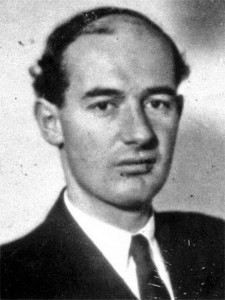Raoul Wallenberg issued Jews with Swedish passports to prevent them being sent to Auschwitz
The family of the Holocaust hero Raoul Wallenberg has issued a new appeal to the Russian authorities to reveal the truth about the fate of the Swedish diplomat, who disappeared after being taken prisoner by Soviet forces in January 1945.
Wallenberg, often referred to as Sweden’s Oskar Schindler, helped tens of thousands of Hungarian Jews escape the Nazi death camps by issuing them with Swedish “protective passports” while serving in Budapest at the end of the Second World War.
To prevent his protected charges from being deported to Auschwitz, he moved Jews from the Budapest ghetto and rehoused them in buildings flying the Swedish flag. As Red Army forces advanced on the city in January 1945, 32-year-old Wallenberg drove out to meet them. He was arrested and subsequently disappeared. His plight remains one of Sweden’s biggest unexplained wartime mysteries.
Numerous inquiries have been made to try to find out what happened to him. None has provided a conclusive explanation of his fate. In a new appeal, timed to coincide with the 100th anniversary of his birth this Saturday, Wallenberg’s relatives have issued a fresh plea to the Russian authorities finally to reveal the truth. Sweden, Hungary and Israel are holding events to mark the anniversary.
“The Russians must know,” Cecilia Ahlberg, the diplomat’s great-niece said this week, “There is no question of them not knowing what happened and we have not had a truthful answer. We want all the facts, what happened and when it happened.”
At the time of Wallenberg’s arrest, the Soviet Union insisted it had no knowledge of his fate. Then, in 1957, Moscow claimed that Wallenberg had died of a heart attack while incarcerated in the Lubyanka, the KGB’s notorious headquarters in Moscow. But in the 1970s and 1980s, witnesses came forward claiming that they had met the diplomat in a Soviet gulag.
Mrs Ahlberg said the uncertainty was traumatic. “It was like a veil, it was constantly present – the sadness and the hope when a new witness came up. Then the despair when the witness proved unreliable. I’ve been living with this all my life,” she told the BBC. In 2000, Russian investigators announced that the Wallenberg had been executed by the KGB. However, a joint Swedish and Russian report concluded in 2001 that the file could not be closed. In 2009, researchers suggested that there was archival evidence of the existence of a mysterious “Prisoner Number 7” who was interrogated in the Lubyanka six days after the diplomat’s supposed death.
Researchers have repeatedly accused Russia of fobbing them off with photocopied material, and of failing to give them proper access to KGB archives. The Wallenberg family has now written to the Russian authorities insisting that they open up the files. “A long time has passed and it’s time to get the truth and for the family to finally get peace,” Mrs Ahlberg said.

